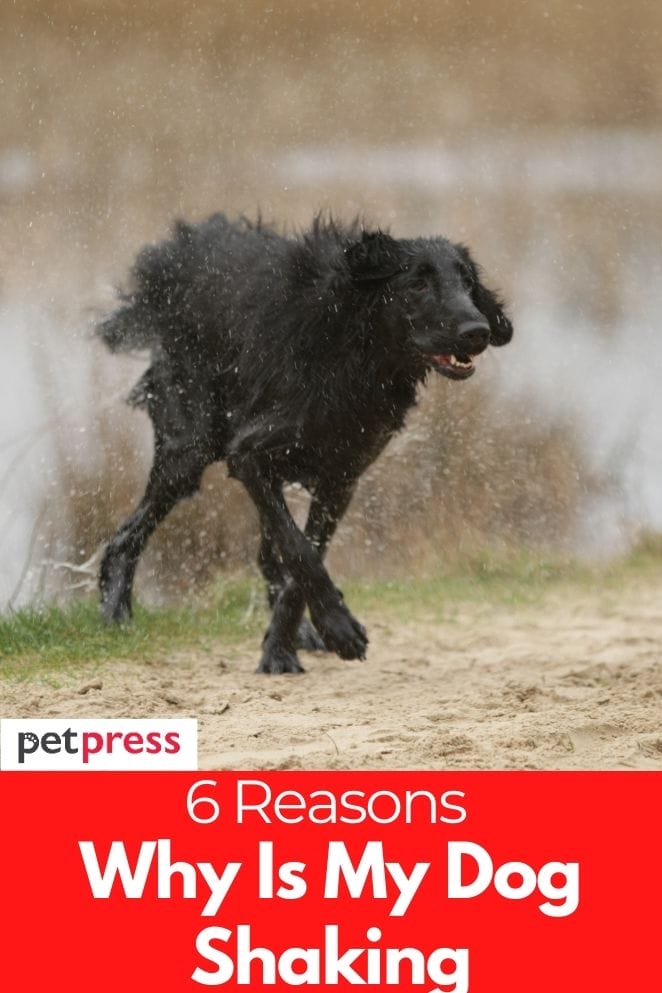
Do you ever wonder why your dog shakes? There are a number of common causes for this behavior, some of which are relatively harmless and some of which can be quite serious.
In this blog post, we will discuss the most common reasons that dogs shake, as well as what you can do to help alleviate their discomfort.
Possible causes of your dog shaking

There are a few reasons why your dog is shaking, including:
Anxiety
One possible reason your dog is shaking is anxiety.
Dogs can experience anxiety from a variety of things, including thunderstorms, car rides, and being left alone.
If your dog is shaking and seems anxious or scared, try to provide them with a calm environment and some reassurance.
Pain
Another possible reason your dog is shaking is pain.
If your dog is shaking and seems to be in pain, it’s important to take them to the vet to rule out any potential medical issues.
Fever
A third possible reason your dog is shaking is a fever. If your dog’s body temperature is above normal, it could be a sign of an infection or other illness.
If you think your dog has a fever, it’s important to take them to the vet for an evaluation.
hypothermia
A fourth possible reason your dog is shaking is hypothermia.
Hypothermia occurs when the body’s core temperature drops below normal and can be dangerous if not treated promptly.
If you think your dog may be suffering from hypothermia, it’s important to take them to the vet right away for treatment.
Heatstroke
A fifth possible reason your dog is shaking is heatstroke.
Heatstroke occurs when the body overheats and can be very dangerous if not treated immediately.
If you think your dog may be suffering from heatstroke, it’s important to take them to the vet right away for treatment.
Old age
A final possible reason your dog is shaking is old age. As dogs get older, they may start to experience tremors due to age-related muscle weakness.
If your dog is shaking and you think it may be due to old age, it’s important to have them checked out by a vet to rule out any other potential causes.
What to do when your dog is shaking?

There are a few things you can do to help your dog when shaking. It includes:
Check for Injuries
If your dog is shaking, the first thing you should do is check for injuries. Look for any cuts, scrapes, or bruises that may be causing your dog pain.
If you find any injuries, clean them with warm water and soap and apply a bandage if necessary.
Check the Temperature
If it’s cold outside, your dog may be shaking from the cold. Take their temperature with a rectal thermometer to see if they have a fever.
A normal dog’s temperature is between 101 and 102 degrees Fahrenheit.
If your dog’s temperature is above 103 degrees, it may have a fever, and you should take them to the vet immediately.
Offer a Warm Drink
If your dog is shaking from the cold, offer them a warm drink to help them warm up. You can give them warm water, chicken broth, or even diluted honey.
Avoid giving them coffee or tea as these can contain caffeine which can be harmful to dogs.
Put on a Warm Jacket
If your dog is shaking and it’s cold outside, put them in a warm jacket or sweater to help them stay warm. You can also put a blanket over their bed to help keep them cozy.
Give Them Comfort
If your dog is shaking and seems scared or anxious, try to comfort them by speaking in a soft voice and petting them gently.
You can also give them a toy or treat to distract them from whatever is making them upset.
Take Them to the Vet
If your dog is shaking and you can’t find any obvious cause, it’s important to take them to the vet for an evaluation.
A vet can help rule out any potential medical issues and provide treatment if necessary.
Shaking in dogs is often a sign of anxiety, pain, fever, hypothermia, heatstroke, or old age.

Final words
If your dog is shaking, there may be a number of different causes, ranging from anxiety and pain to fever or hypothermia.
To help your dog feel better, it is important to check for injuries, take their temperature if necessary, offer them a warm drink, and put on a warm jacket if needed.
You should also try to comfort your dog and take them to the vet if you are unable to find a cause for its shaking.
With prompt treatment and care, your dog should be feeling better soon.
- Does Cat Litter Melt Ice? The Complete Guide to Winter Safety - January 30, 2026
- Happy Tail Dogs: Understanding This Common Canine Condition - January 29, 2026
- How Cold Can Outdoor Cats Handle? Feline Winter Safety - January 27, 2026


GIPHY App Key not set. Please check settings